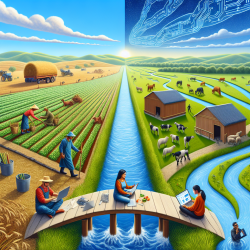Understanding the Social Contract in Agriculture
The relationship between farmers and non-farmers is a complex web of interdependencies that has evolved over time. This relationship is often described as a social contract, a mutual agreement where both parties have responsibilities towards each other. The research article "Farmer and Non-Farmer Responsibility to Each Other: Negotiating the Social Contracts and Public Good of Agriculture" by Garrett Graddy-Lovelace explores this intricate relationship and its implications for agricultural governance.
Key Insights from the Research
The research highlights the historical context of the social contract in agriculture, tracing its origins to U.S. agricultural policy. Initially designed to be a contract between farmers and non-farmers, this agreement aimed to manage the chronic crisis of commodity crop overproduction. However, over time, this contract has been compromised by racial and gender biases, leading to an erosion of its original intent.
Graddy-Lovelace emphasizes the need for a renewed social contract that addresses these historical injustices and supports a diverse and resilient agricultural sector. This involves negotiating fair social contracts that ensure equitable price floors for farmers, ranchers, and food providers, thereby promoting a multifunctional public good in agriculture.
Implementing the Research Findings
For practitioners in the field of agriculture and education, implementing the outcomes of this research can lead to significant improvements in their practice. Here are some actionable steps:
- Promote Awareness: Educate stakeholders about the historical context and current challenges of the social contract in agriculture. This can be achieved through workshops, seminars, and community discussions.
- Advocate for Policy Changes: Work with policymakers to develop and implement policies that address the inequities in the agricultural sector. This includes advocating for fair pricing mechanisms and support for diverse farming communities.
- Foster Collaboration: Encourage collaboration between farmers, non-farmers, and policymakers to create a more inclusive and equitable agricultural system. This can involve forming alliances and networks that focus on shared goals and mutual benefits.
- Conduct Further Research: Encourage further research into the social contract framework and its application in different agricultural contexts. This can help identify best practices and innovative solutions for addressing the challenges faced by farmers and non-farmers alike.
Encouraging Further Research
The research by Graddy-Lovelace serves as a preliminary analysis of farm policy and highlights the need for ongoing research to inform negotiations about agricultural governance. Practitioners are encouraged to delve deeper into this topic and explore how the social contract framework can be applied to create more equitable and sustainable agricultural systems.
To read the original research paper, please follow this link: Farmer and Non-Farmer Responsibility to Each Other: Negotiating the Social Contracts and Public Good of Agriculture.










